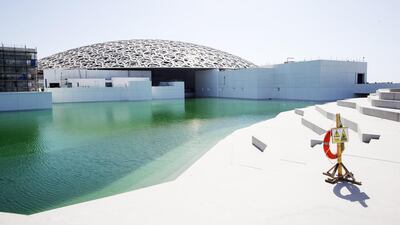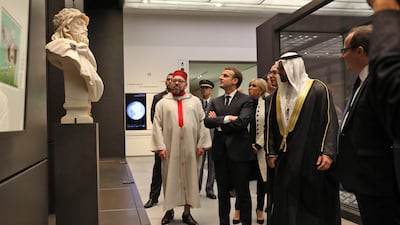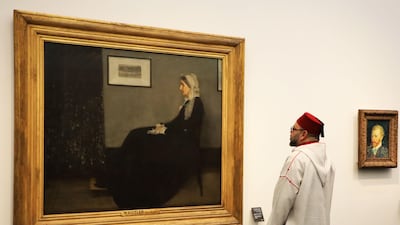The opening of Louvre Abu Dhabi drew the eyes of the world to the Middle East’s first “universal museum” and the beginning of closer cultural ties between France and the UAE.
French President Emmanuel Macron joined Sheikh Mohammed bin Zayed, Crown Prince of Abu Dhabi and Sheikh Mohammed bin Rashid, Ruler of Dubai at an official event at the museum on Saadiyat Island, declaring that Louvre Abu Dhabi showed their two nations were “forever intertwined”.
However, for many watching in Britain, the celebration was a moment of reflection as art dealers and experts asked themselves why the UK, a close ally of the UAE, had missed out on sharing its own cultural inheritance in the region by exporting one of its own acclaimed art galleries and museums. How had national museums such as the Victoria and Albert or the Tate failed to attain such a mutually-beneficial collaboration?
Guy Sainty, a London-based art dealer and owner of the Stair Sainty Gallery who attended the opening of Louvre Abu Dhabi, said British politicians were failing to use cultural initiatives to gain diplomatic and economic benefits.
_______________
Read more:
Louvre Abu Dhabi virtual tour: the objects you shouldn't miss
Watch: Building of Louvre Abu Dhabi captured in stunning eight-year time-lapse video
_______________
“It’s a fantastic thing for French culture, for Abu Dhabi and the region,” Mr Sainty told The National. “Louvre Abu Dhabi went hand in hand with the Sorbonne and the French naval base. Immediately then you share more business contacts.
“You have people looking at France and really engaging them as equals. The whole idea behind Louvre Abu Dhabi is that it is two equal museums coming together.”
The art dealer, who sold paintings to Louvre Abu Dhabi, argued that British influence would dwindle if the UK does not share its cultural resources with the region.
“Britain had the lead there for a long time because we helped develop so much of the United Arab Emirates,” Mr Sainty said. “We are allowing it to slip away.”
Ahead of the opening, the Director of London's V&A museum, the world's largest museum of decorative arts and design, which houses a permanent collection of over 4 million objects, praised Louvre Abu Dhabi as “a thing of great beauty”.
Writing in British newspaper The Guardian, Tristram Hunt said the museum “is a template for the mix of ingenuity, vision and spirit of collaboration which post-Brexit Britain will need to display on the world stage”.
Through collaborating with an arts venture in the UAE, France secured an estimated 1 billion euros (Dh4.3bn) for its cultural economy, at a time when budgets are under pressure.
In Britain, 70 per cent of national museums reported a decrease in public funding between 2015 and 2016, according to figures collected by the Museums Association.
Mr Hunt, a former Labour Party shadow minister, said the cuts to UK arts budgets meant that it would be a “real challenge to retain our influence” on a global scale.
Outside of the arts world, Louvre Abu Dhabi signalled closer diplomatic ties between France and the UAE.
During his visit to the Emirates last week, Mr Macron saw the museum as the foundation of French culture and influence in the region. He pledged to get the French language back in schools in the UAE, in which English is the favoured language.
The joint initiative to create Louvre Abu Dhabi, which was forged in 2007, stretched further than the arts. In 2009, a French naval base was opened in Abu Dhabi, showing France's deepening military cooperation with the UAE. While Abu Dhabi is also home to the first international outpost of the prestigious Paris-Sorbonne university.
Damian Collins, chair of the Digital, Culture, Media and Sport select committee, pointed to British Museum working with the UAE on the Zayed National Museum as evidence of the UK's cultural collaboration with the country.
“I am pleased that the United Kingdom enjoys strong cultural ties with many areas of the world, including the UAE. The UAE has clearly put a great deal of resource into placing culture at the heart of its national vision," Mr Collins told The National.
"Whilst, naturally, many have focused on the opening of the Louvre, I think it is important not to forget that the British Museum is working closely with the authorities in the UAE on the Zayed National Museum project."
The Zayed National Museum, which was announced in 2007 and scheduled to open in 2013, was originally slated to be the first of several to open in the new Saadiyat Island Cultural District.
However, construction contracts for the building of the museum have yet to be awarded.
A ten-year collaboration with the British Museum was announced in 2009 to help curate exhibitions and lend the Zayed National Museum hundreds of artefacts.
The British Museum said in October that under the current contract, which ends in 2019, it is unlikely any loans will take place.













